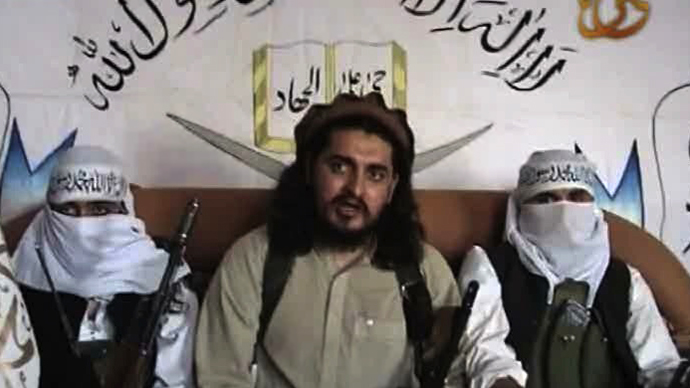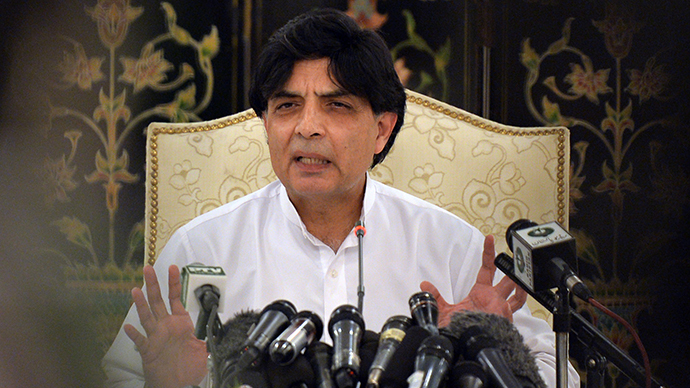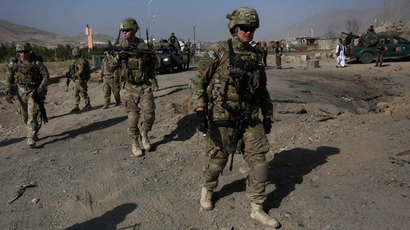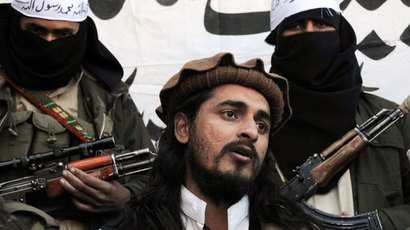Pakistan reviews US relationship over Taliban drone kill

The Pakistani government is holding a high-level meeting to review its ties with the US. The country’s top officials were infuriated with the US drone assassination of a Taliban commander, who was about to engage in talks with Islamabad.
The gathering on Sunday is to hammer out Islamabad’s response to the death of the Pakistani Taliban leader, Hakimullah Mehsud, who was killed by a US drone attack on Friday, hours before a planned meeting with a group of cleric mediators and ahead of an invitation to start talks with the Pakistani government.
“The murder of Hakimullah is the murder of all efforts at peace," Pakistan Interior Minister Chaudhry Nisa said earlier, as he was decrying the drone attack.
"Brick by brick, in the last seven weeks, we tried to evolve a
process by which we could bring peace to Pakistan and what have
you [the US] done?" he said.

The killing of the Taliban commander sparked the worst-in-months outcry in Pakistan over American actions in the country. Some politicians called for a blockade of US truck convoys, which deliver supplies to the NATO-led coalition fighting in neighboring Afghanistan.
The Pakistani government halted the US transportation of military cargoes for seven months last year, in response to the botched US raid on two checkpoints in November, which left 24 Pakistani troops killed. Pakistan also ordered US troops to vacate the Shamsi airbase, which the Americans used for its Pakistan operations, including drone surveillance and strikes.
The threat to cut supply lines may be quite serious ahead of the planned pullout of troops from Afghanistan. However, Washington has considerable leverage over its uneasy ally, providing financial aid to cash-strapped Pakistan.
Under normal circumstances, the people of Pakistan would have celebrated the death of Mehsud, but the timing and means in which the Taliban leader died has made it very difficult for “Pakistanis to swallow”, Sultan M. Hali, a retired Pakistani Air Force officer and journalist, told RT.
Hali says one theory popularized within Pakistan is that the United States does not want fully withdraw from Afghanistan in 2014, but would rather leave a 20,000 strong contingent until 2024.
“It appears that everyone else is on board as far as the American plan is concerned except for Pakistan, so perhaps [the assassination of Mehsud] may be a move to destabilize Pakistan, to force them to withdraw whatever tacit approval or support they have for the Taliban, so that the American plans may continue. That is one of the major conspiracy theories going around, and there may be some credence to it.”
Meanwhile the Pakistani Taliban leaderships are going to choose a successor to Mehsud. Some reports said on Saturday that 38-year-old Khan Said, known as Sajna, had been chosen, but later comments said no final decision had been taken. The main competitor to Said, who is thought to be relatively moderate, is Mullah Fazlullah, a strictly conservative commander.
Following the killing the Taliban called off rapprochement with official Islamabad and pledged a campaign of retaliation bombings. If Fazlullah is chosen over Said, experts say, any attempts of peace talks with the radical movement is likely to be buried for months.
In a similar incident in Afghanistan, American military action last month ruined Kabul’s attempts to engage with the Afghan branch of the Taliban. US forces captured the Taliban commander, Latif Mehsud, who was Hakimullah Mehsud’s lieutenant, the man the Afghan government hoped could help them negotiate with the movement.














